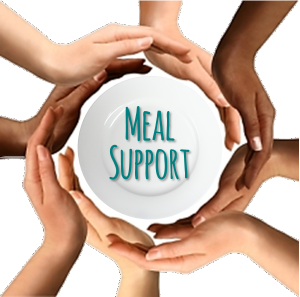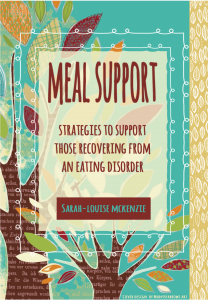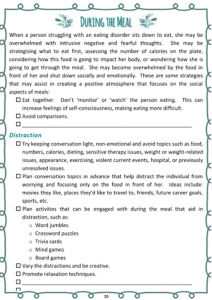 Establishing regularity and adequacy when it came to meal times was extremely difficult for me to do alone and I found the transition from the intensive supervision and support of hospital, to the comparatively minimal support in the community extremely challenging and frequently resulted in being readmitted within a few weeks. As an outpatient, I knew I needed daily meal support to strengthen recovery and reduce the risk of relapse, but such a program was inaccessible. My family, partner, friends, and treating team were willing to assist in any way they could, but were unsure of how to do so and the only meal support guidelines that existed were rigid inpatient ones and the Maudsley Approach, which is designed for adolescents. Both of these were inappropriate for adults desiring support in the community and in their own homes. Time and again, I was told that what I needed and the resources that would be so beneficial, just didn’t exist.
Establishing regularity and adequacy when it came to meal times was extremely difficult for me to do alone and I found the transition from the intensive supervision and support of hospital, to the comparatively minimal support in the community extremely challenging and frequently resulted in being readmitted within a few weeks. As an outpatient, I knew I needed daily meal support to strengthen recovery and reduce the risk of relapse, but such a program was inaccessible. My family, partner, friends, and treating team were willing to assist in any way they could, but were unsure of how to do so and the only meal support guidelines that existed were rigid inpatient ones and the Maudsley Approach, which is designed for adolescents. Both of these were inappropriate for adults desiring support in the community and in their own homes. Time and again, I was told that what I needed and the resources that would be so beneficial, just didn’t exist.
I then began instituting my own meal support program, organising to eat at least one meal a day with a support person (my therapist, case manager/psychologist, mentor, partner, parents, friends, or at group therapy). It was challenging and required navigating new waters, but in collaboration, we began to increase my regularity and adequacy of nutrition and take steps towards recovery. Through trial and error, we discovered what did and didn’t work, and I became more skilled at identifying and communicating to my support people what I needed. Through having people support me at meal times, I was able to access role models for learning skills such as an appropriate pace of eating, appropriate meal time behaviours, normal quantities, healthy discussion around the table, challenge ‘food fears’ and eating disordered behaviours and rituals, introduce new foods, and develop coping strategies to eat out at restaurants and food courts.
Amanda Deardon (coordinator of Isis – the Eating Issues Centre Inc) approached me with ‘Hall, D, Leichner, P, Calderon, R & Caufield, S 2004, An introduction to effective meal support: a guide for family and friends, Children’s & Women’s Health Centre of British Columbia, Vancouver, Canada’, and asked if I’d be interested in adapting the booklet, which had been designed for working with children and adolescents, to reflect the dynamics of working with adults. Initially, I designed a single page flyer with basic principles that I discovered had worked for me. As I sought feedback from others, the project grew into a booklet of its own. I sought to create something that reflected the support needs across the continuum of eating disorders and captured those things which my support people wish they had known from the onset of my eating disorder. The resultant ‘Meal Support: strategies to support those recovering from an eating disorder’ book is a result of the feedback, input, and collaboration of individuals recovering from eating disorders, the people who support them, clinical professionals, and eating disorder therapists.
 I really encourage you to get a copy of this and read it through (and also have those who you would like to support you read it!!!). It is easy to read and designed in such a way that you can identify your goals and that which would support you, as I recognise that when it comes to support and recovery, one size does not fit all.
I really encourage you to get a copy of this and read it through (and also have those who you would like to support you read it!!!). It is easy to read and designed in such a way that you can identify your goals and that which would support you, as I recognise that when it comes to support and recovery, one size does not fit all.
I am hoping to be part of establishing a community-based meal support program in the near future, so if you would like to be kept updated about this, find out more information, be placed on the waiting list, or volunteer in providing meal support, please email me. Taking responsibility for your own recovery though is generally far more effective than externally enforced treatment, so I encourage you to create the support you need around meals…ask your GP or therapist if you can eat a snack or a meal with them during your appointment, ask some close family or friends if they will have a meal with you once a week, etc. The Meal Support Book is a great resource to assist you and your support person in your journey.
So what is meal support?
Broadly speaking, meal support is the emotional and practical support provided to a person struggling with an eating disorder before, during and after meals. The breadth and depth to which meal support is provided varies depending on the individual’s stage of recovery and motivation for change. The booklet is designed to be utilised in collaboration with the individual seeking recovery and the person providing support, to identify particular needs and strategies for meal completion and recovery. However, it is important to bear in mind that meal support is more than just about food and eating, it is about being beside someone as they battle for recovery and what matters most to them.
If you are providing meal support for a loved one, check out the ‘Providing Meal Support‘ in the Family and Friends section.
What topics does the book (Meal Support: strategies to support those recovering from an eating disorder) cover?
♦Introductory Considerations ♦Understanding Change ♦What is Meal Support? ♦Assessing Readiness ♦What Does NOT Help ♦Communication (What Not to Say, Examples of What to Say or Do) ♦Goals for Meal Support ♦A Word on Food ♦RAVES model ♦Areas of Support ♦Safe and Challenge Foods ♦Establishing Mealtime Guidelines ♦Before the Meal – Planning and Preparation (Environment, Structure, Meal Preparation, Serving) ♦During the Meal (Distraction, Coaching and Reassurance, Useful Phrases, Addressing Disordered Eating Behaviours, Questions to Ponder) ♦After the Meal – Post Meal Support (What to Expect – Physical Symptoms, What to Expect – Psychological Effects, Distraction) ♦Coping Strategies (Coping Strategies for Dealing with Intrusive Thoughts, Coping Strategies for Dealing with Intrusive Images, Coping Strategies for Dealing with Unpleasant Feelings) ♦Specific Challenges –RAVES, Eating in Public, Relapse Concerns (Warning Signs, Triggers, Action Plan, Other Things I’d Like You to Know or Do to Support Me) ♦Self-Care for Support People ♦Words from Various Support People (From 2 Fathers, From 2 Mothers, From a Partner, From a Sibling, From a Friend) ♦Concluding Thoughts ♦Eating Disorder Services Directory
Look Inside ⇓ ‘Meal Support: strategies to support those recovering from an eating disorder’…
Click on the images below to read the Contents – Preface and Pages 20 – 23…



